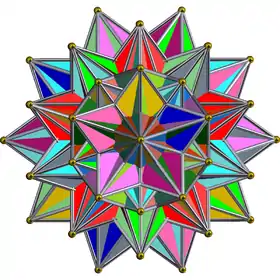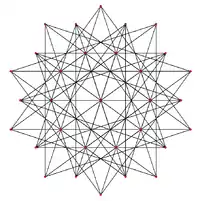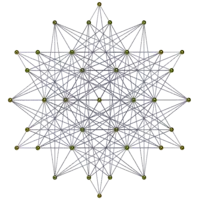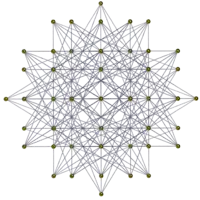Grand 600-cell
In geometry, the grand 600-cell or grand polytetrahedron is a regular star 4-polytope with Schläfli symbol {3,3,5/2}. It is one of 10 regular Schläfli-Hess polytopes. It is the only one with 600 cells.
| Grand 600-cell | |
|---|---|
 Orthogonal projection | |
| Type | Regular star 4-polytope |
| Cells | 600 {3,3} |
| Faces | 1200 {3} |
| Edges | 720 |
| Vertices | 120 |
| Vertex figure | {3,5/2} |
| Schläfli symbol | {3,3,5/2} |
| Coxeter-Dynkin diagram | |
| Symmetry group | H4, [3,3,5] |
| Dual | Great grand stellated 120-cell |
| Properties | Regular |
It is one of four regular star 4-polytopes discovered by Ludwig Schläfli. It is named by John Horton Conway, extending the naming system by Arthur Cayley for the Kepler-Poinsot solids.
The grand 600-cell can be seen as the four-dimensional analogue of the great icosahedron (which in turn is analogous to the pentagram); both of these are the only regular n-dimensional star polytopes which are derived by performing stellational operations on the pentagonal polytope which has simplectic faces. It can be constructed analogously to the pentagram, its two-dimensional analogue, via the extension of said (n-1)-D simplex faces of the core nD polytope (tetrahedra for the grand 600-cell, equilateral triangles for the great icosahedron, and line segments for the pentagram) until the figure regains regular faces.
The Grand 600-cell is also dual to the great grand stellated 120-cell, mirroring the great icosahedron's duality with the great stellated dodecahedron (which in turn is also analogous to the pentagram); all of these are the final stellations of the n-dimensional "dodecahedral-type" pentagonal polytope.
Related polytopes
It has the same edge arrangement as the great stellated 120-cell, and grand stellated 120-cell, and same face arrangement as the great icosahedral 120-cell.
| H3 | A2 / B3 / D4 | A3 / B2 |
|---|---|---|
 |
 |
 |
With its dual, it forms the compound of great grand stellated 120-cell and grand 600-cell.
See also
- List of regular polytopes
- Convex regular 4-polytope
- Kepler-Poinsot solids - regular star polyhedron
- Star polygon - regular star polygons
References
- Edmund Hess, (1883) Einleitung in die Lehre von der Kugelteilung mit besonderer Berücksichtigung ihrer Anwendung auf die Theorie der Gleichflächigen und der gleicheckigen Polyeder .
- H. S. M. Coxeter, Regular Polytopes, 3rd. ed., Dover Publications, 1973. ISBN 0-486-61480-8.
- John H. Conway, Heidi Burgiel, Chaim Goodman-Strass, The Symmetries of Things 2008, ISBN 978-1-56881-220-5 (Chapter 26, Regular Star-polytopes, pp. 404–408)
- Klitzing, Richard. "4D uniform polytopes (polychora) x3o3o5/2o - gax".
